Organisational Behaviour Report: Culture, Politics, Power and Teams
VerifiedAdded on 2020/12/09
|14
|4617
|218
Report
AI Summary
This report examines organisational behaviour within the context of A David & Co Limited, a food service company. It explores how organisational culture, politics, and power influence individual and team behaviour and performance. The report delves into various motivational theories, including content and process theories like Maslow's Hierarchy of Needs and Herzberg's Two-Factor Theory, and their application in enhancing employee motivation. Furthermore, it contrasts the characteristics of effective and ineffective teams, highlighting the importance of team building for task accomplishment. Finally, it applies concepts and philosophies of organisational behaviour to a given business situation, providing a comprehensive analysis of workplace dynamics and strategies for improving organisational outcomes.
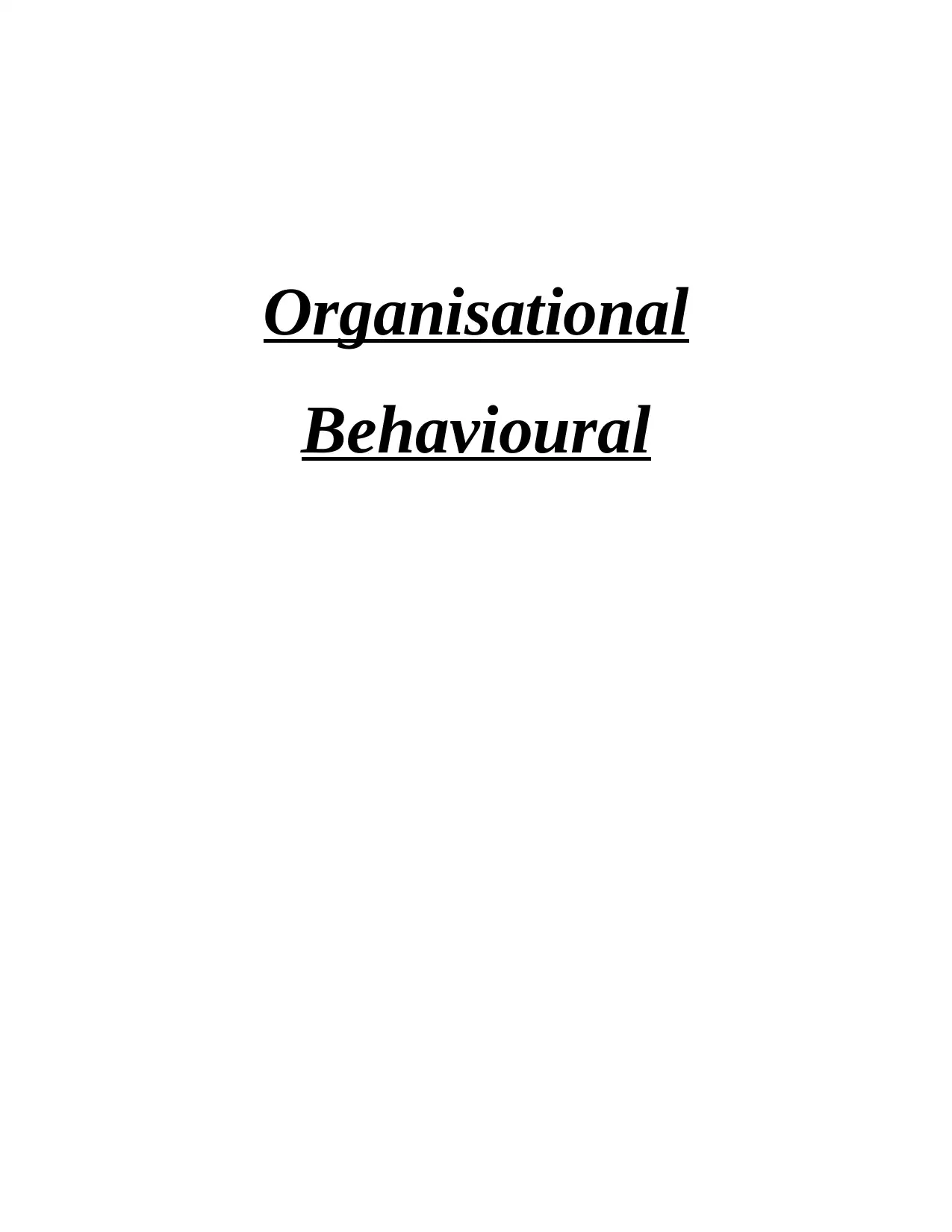
Organisational
Behavioural
Behavioural
Paraphrase This Document
Need a fresh take? Get an instant paraphrase of this document with our AI Paraphraser
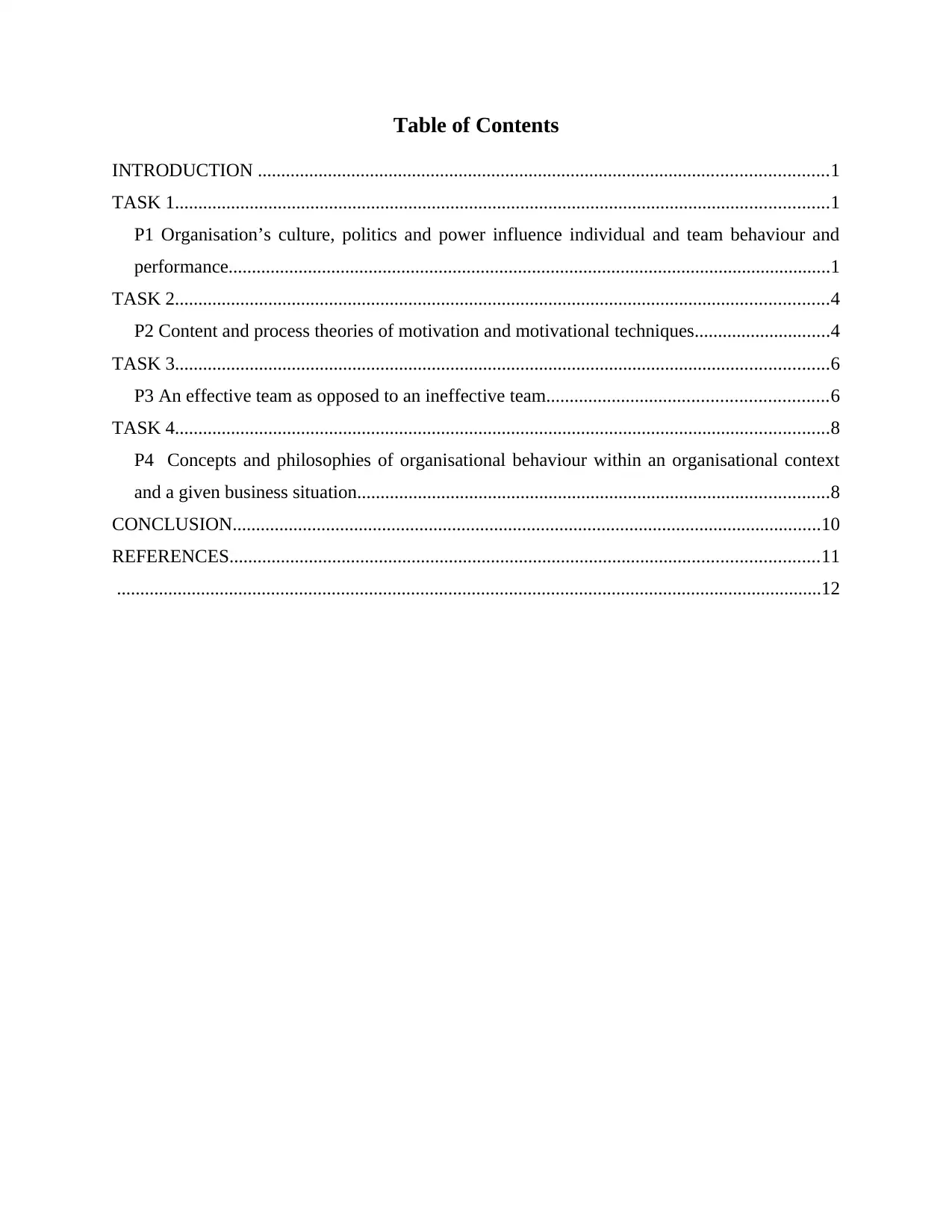
Table of Contents
INTRODUCTION ..........................................................................................................................1
TASK 1............................................................................................................................................1
P1 Organisation’s culture, politics and power influence individual and team behaviour and
performance.................................................................................................................................1
TASK 2............................................................................................................................................4
P2 Content and process theories of motivation and motivational techniques.............................4
TASK 3............................................................................................................................................6
P3 An effective team as opposed to an ineffective team............................................................6
TASK 4............................................................................................................................................8
P4 Concepts and philosophies of organisational behaviour within an organisational context
and a given business situation.....................................................................................................8
CONCLUSION..............................................................................................................................10
REFERENCES..............................................................................................................................11
.......................................................................................................................................................12
INTRODUCTION ..........................................................................................................................1
TASK 1............................................................................................................................................1
P1 Organisation’s culture, politics and power influence individual and team behaviour and
performance.................................................................................................................................1
TASK 2............................................................................................................................................4
P2 Content and process theories of motivation and motivational techniques.............................4
TASK 3............................................................................................................................................6
P3 An effective team as opposed to an ineffective team............................................................6
TASK 4............................................................................................................................................8
P4 Concepts and philosophies of organisational behaviour within an organisational context
and a given business situation.....................................................................................................8
CONCLUSION..............................................................................................................................10
REFERENCES..............................................................................................................................11
.......................................................................................................................................................12
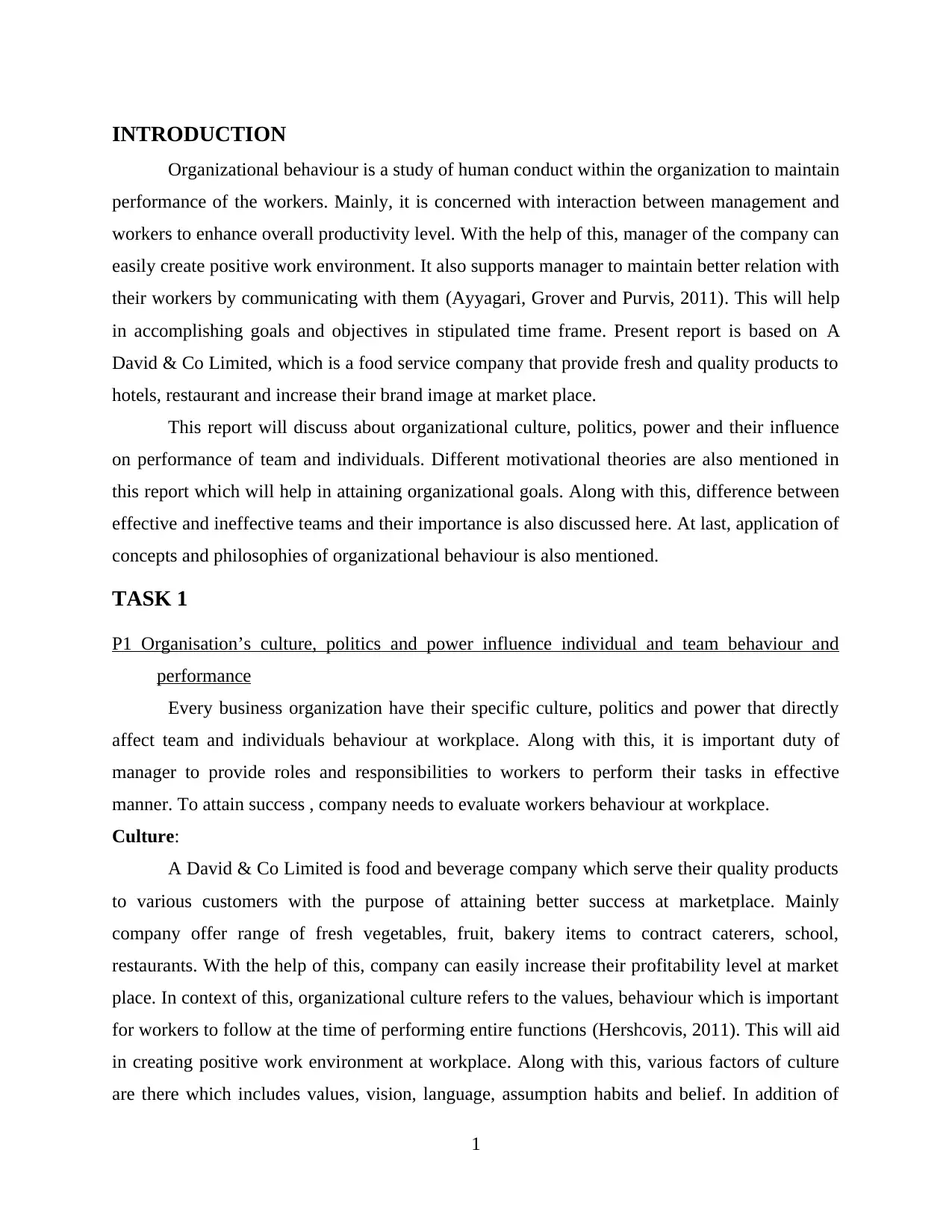
INTRODUCTION
Organizational behaviour is a study of human conduct within the organization to maintain
performance of the workers. Mainly, it is concerned with interaction between management and
workers to enhance overall productivity level. With the help of this, manager of the company can
easily create positive work environment. It also supports manager to maintain better relation with
their workers by communicating with them (Ayyagari, Grover and Purvis, 2011). This will help
in accomplishing goals and objectives in stipulated time frame. Present report is based on A
David & Co Limited, which is a food service company that provide fresh and quality products to
hotels, restaurant and increase their brand image at market place.
This report will discuss about organizational culture, politics, power and their influence
on performance of team and individuals. Different motivational theories are also mentioned in
this report which will help in attaining organizational goals. Along with this, difference between
effective and ineffective teams and their importance is also discussed here. At last, application of
concepts and philosophies of organizational behaviour is also mentioned.
TASK 1
P1 Organisation’s culture, politics and power influence individual and team behaviour and
performance
Every business organization have their specific culture, politics and power that directly
affect team and individuals behaviour at workplace. Along with this, it is important duty of
manager to provide roles and responsibilities to workers to perform their tasks in effective
manner. To attain success , company needs to evaluate workers behaviour at workplace.
Culture:
A David & Co Limited is food and beverage company which serve their quality products
to various customers with the purpose of attaining better success at marketplace. Mainly
company offer range of fresh vegetables, fruit, bakery items to contract caterers, school,
restaurants. With the help of this, company can easily increase their profitability level at market
place. In context of this, organizational culture refers to the values, behaviour which is important
for workers to follow at the time of performing entire functions (Hershcovis, 2011). This will aid
in creating positive work environment at workplace. Along with this, various factors of culture
are there which includes values, vision, language, assumption habits and belief. In addition of
1
Organizational behaviour is a study of human conduct within the organization to maintain
performance of the workers. Mainly, it is concerned with interaction between management and
workers to enhance overall productivity level. With the help of this, manager of the company can
easily create positive work environment. It also supports manager to maintain better relation with
their workers by communicating with them (Ayyagari, Grover and Purvis, 2011). This will help
in accomplishing goals and objectives in stipulated time frame. Present report is based on A
David & Co Limited, which is a food service company that provide fresh and quality products to
hotels, restaurant and increase their brand image at market place.
This report will discuss about organizational culture, politics, power and their influence
on performance of team and individuals. Different motivational theories are also mentioned in
this report which will help in attaining organizational goals. Along with this, difference between
effective and ineffective teams and their importance is also discussed here. At last, application of
concepts and philosophies of organizational behaviour is also mentioned.
TASK 1
P1 Organisation’s culture, politics and power influence individual and team behaviour and
performance
Every business organization have their specific culture, politics and power that directly
affect team and individuals behaviour at workplace. Along with this, it is important duty of
manager to provide roles and responsibilities to workers to perform their tasks in effective
manner. To attain success , company needs to evaluate workers behaviour at workplace.
Culture:
A David & Co Limited is food and beverage company which serve their quality products
to various customers with the purpose of attaining better success at marketplace. Mainly
company offer range of fresh vegetables, fruit, bakery items to contract caterers, school,
restaurants. With the help of this, company can easily increase their profitability level at market
place. In context of this, organizational culture refers to the values, behaviour which is important
for workers to follow at the time of performing entire functions (Hershcovis, 2011). This will aid
in creating positive work environment at workplace. Along with this, various factors of culture
are there which includes values, vision, language, assumption habits and belief. In addition of
1
⊘ This is a preview!⊘
Do you want full access?
Subscribe today to unlock all pages.

Trusted by 1+ million students worldwide
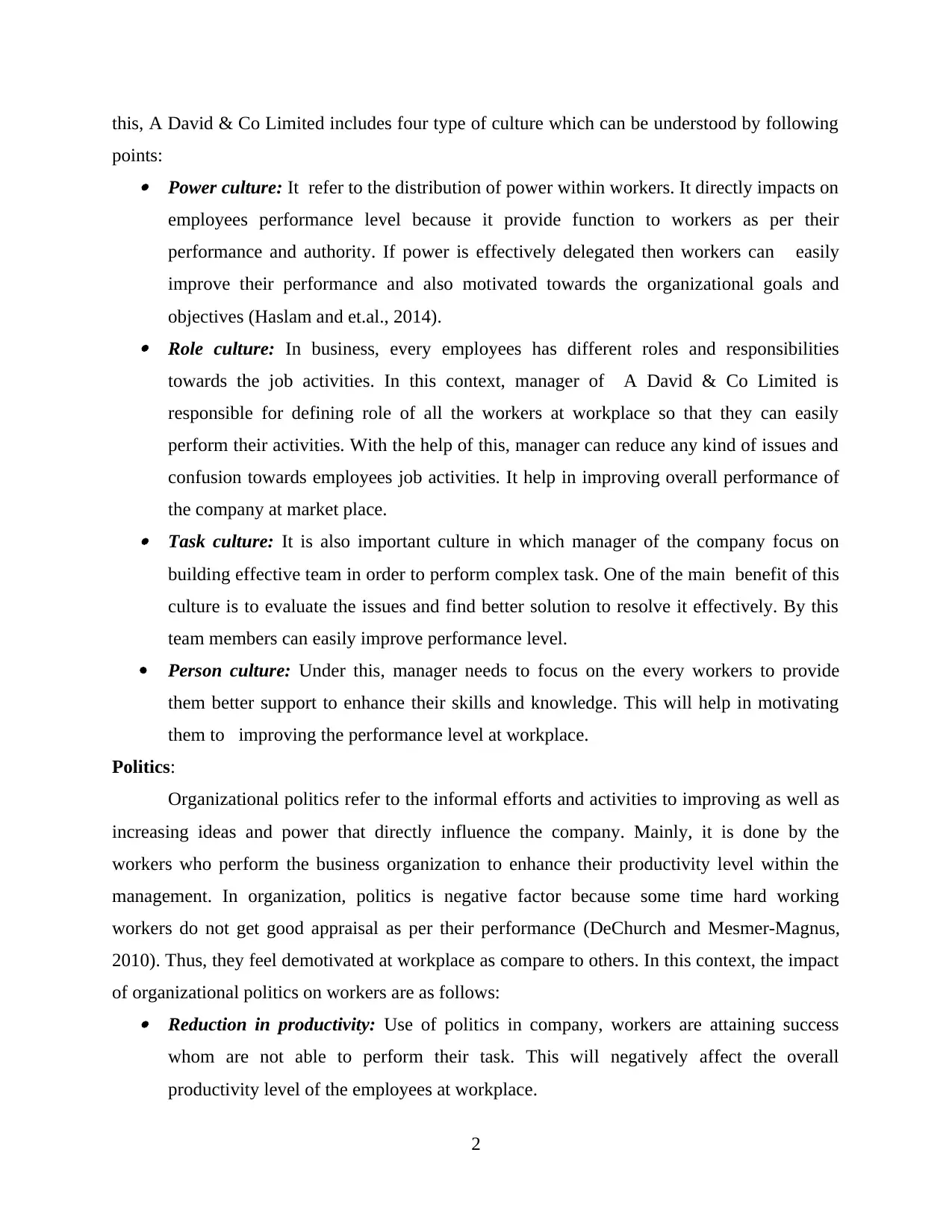
this, A David & Co Limited includes four type of culture which can be understood by following
points: Power culture: It refer to the distribution of power within workers. It directly impacts on
employees performance level because it provide function to workers as per their
performance and authority. If power is effectively delegated then workers can easily
improve their performance and also motivated towards the organizational goals and
objectives (Haslam and et.al., 2014). Role culture: In business, every employees has different roles and responsibilities
towards the job activities. In this context, manager of A David & Co Limited is
responsible for defining role of all the workers at workplace so that they can easily
perform their activities. With the help of this, manager can reduce any kind of issues and
confusion towards employees job activities. It help in improving overall performance of
the company at market place. Task culture: It is also important culture in which manager of the company focus on
building effective team in order to perform complex task. One of the main benefit of this
culture is to evaluate the issues and find better solution to resolve it effectively. By this
team members can easily improve performance level.
Person culture: Under this, manager needs to focus on the every workers to provide
them better support to enhance their skills and knowledge. This will help in motivating
them to improving the performance level at workplace.
Politics:
Organizational politics refer to the informal efforts and activities to improving as well as
increasing ideas and power that directly influence the company. Mainly, it is done by the
workers who perform the business organization to enhance their productivity level within the
management. In organization, politics is negative factor because some time hard working
workers do not get good appraisal as per their performance (DeChurch and Mesmer-Magnus,
2010). Thus, they feel demotivated at workplace as compare to others. In this context, the impact
of organizational politics on workers are as follows: Reduction in productivity: Use of politics in company, workers are attaining success
whom are not able to perform their task. This will negatively affect the overall
productivity level of the employees at workplace.
2
points: Power culture: It refer to the distribution of power within workers. It directly impacts on
employees performance level because it provide function to workers as per their
performance and authority. If power is effectively delegated then workers can easily
improve their performance and also motivated towards the organizational goals and
objectives (Haslam and et.al., 2014). Role culture: In business, every employees has different roles and responsibilities
towards the job activities. In this context, manager of A David & Co Limited is
responsible for defining role of all the workers at workplace so that they can easily
perform their activities. With the help of this, manager can reduce any kind of issues and
confusion towards employees job activities. It help in improving overall performance of
the company at market place. Task culture: It is also important culture in which manager of the company focus on
building effective team in order to perform complex task. One of the main benefit of this
culture is to evaluate the issues and find better solution to resolve it effectively. By this
team members can easily improve performance level.
Person culture: Under this, manager needs to focus on the every workers to provide
them better support to enhance their skills and knowledge. This will help in motivating
them to improving the performance level at workplace.
Politics:
Organizational politics refer to the informal efforts and activities to improving as well as
increasing ideas and power that directly influence the company. Mainly, it is done by the
workers who perform the business organization to enhance their productivity level within the
management. In organization, politics is negative factor because some time hard working
workers do not get good appraisal as per their performance (DeChurch and Mesmer-Magnus,
2010). Thus, they feel demotivated at workplace as compare to others. In this context, the impact
of organizational politics on workers are as follows: Reduction in productivity: Use of politics in company, workers are attaining success
whom are not able to perform their task. This will negatively affect the overall
productivity level of the employees at workplace.
2
Paraphrase This Document
Need a fresh take? Get an instant paraphrase of this document with our AI Paraphraser
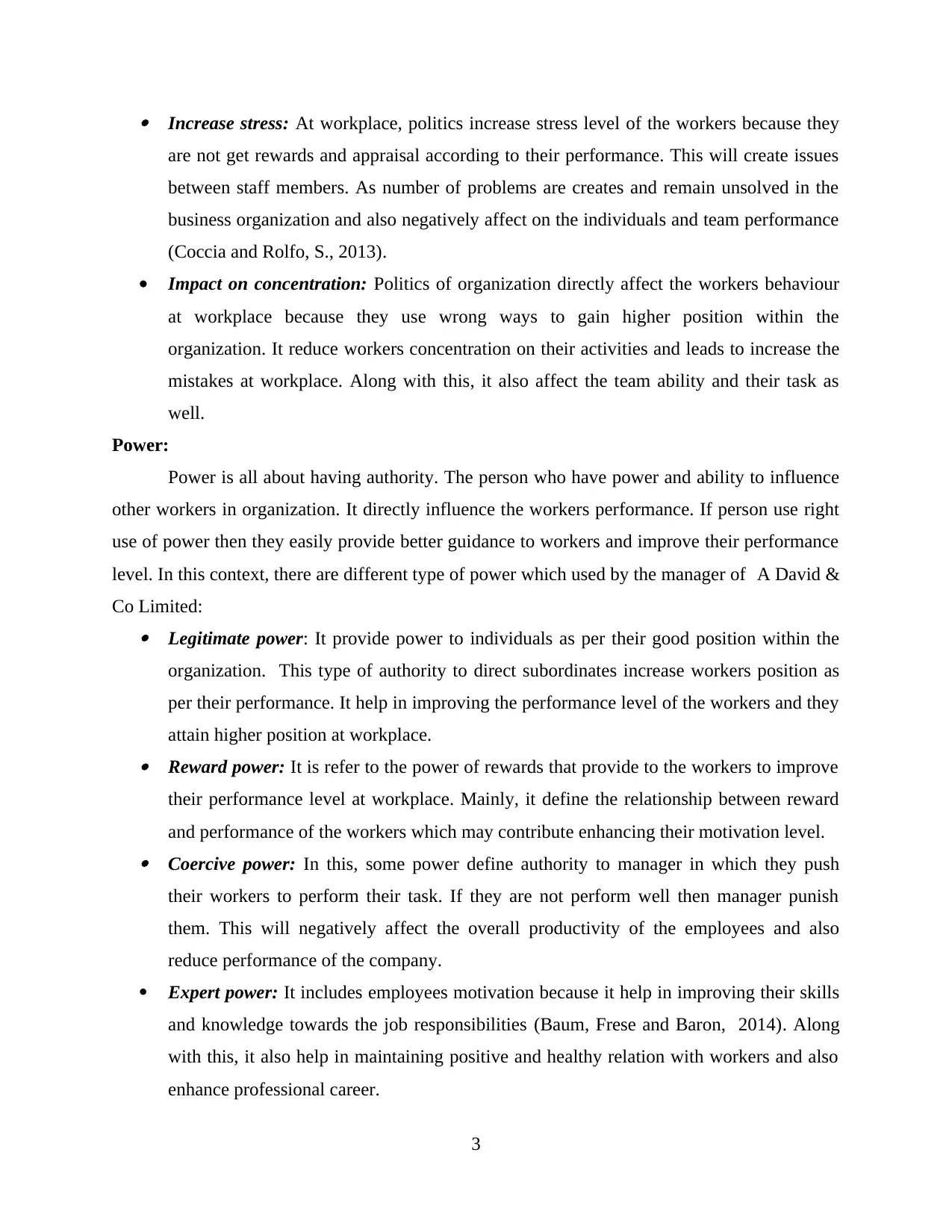
Increase stress: At workplace, politics increase stress level of the workers because they
are not get rewards and appraisal according to their performance. This will create issues
between staff members. As number of problems are creates and remain unsolved in the
business organization and also negatively affect on the individuals and team performance
(Coccia and Rolfo, S., 2013).
Impact on concentration: Politics of organization directly affect the workers behaviour
at workplace because they use wrong ways to gain higher position within the
organization. It reduce workers concentration on their activities and leads to increase the
mistakes at workplace. Along with this, it also affect the team ability and their task as
well.
Power:
Power is all about having authority. The person who have power and ability to influence
other workers in organization. It directly influence the workers performance. If person use right
use of power then they easily provide better guidance to workers and improve their performance
level. In this context, there are different type of power which used by the manager of A David &
Co Limited: Legitimate power: It provide power to individuals as per their good position within the
organization. This type of authority to direct subordinates increase workers position as
per their performance. It help in improving the performance level of the workers and they
attain higher position at workplace. Reward power: It is refer to the power of rewards that provide to the workers to improve
their performance level at workplace. Mainly, it define the relationship between reward
and performance of the workers which may contribute enhancing their motivation level. Coercive power: In this, some power define authority to manager in which they push
their workers to perform their task. If they are not perform well then manager punish
them. This will negatively affect the overall productivity of the employees and also
reduce performance of the company.
Expert power: It includes employees motivation because it help in improving their skills
and knowledge towards the job responsibilities (Baum, Frese and Baron, 2014). Along
with this, it also help in maintaining positive and healthy relation with workers and also
enhance professional career.
3
are not get rewards and appraisal according to their performance. This will create issues
between staff members. As number of problems are creates and remain unsolved in the
business organization and also negatively affect on the individuals and team performance
(Coccia and Rolfo, S., 2013).
Impact on concentration: Politics of organization directly affect the workers behaviour
at workplace because they use wrong ways to gain higher position within the
organization. It reduce workers concentration on their activities and leads to increase the
mistakes at workplace. Along with this, it also affect the team ability and their task as
well.
Power:
Power is all about having authority. The person who have power and ability to influence
other workers in organization. It directly influence the workers performance. If person use right
use of power then they easily provide better guidance to workers and improve their performance
level. In this context, there are different type of power which used by the manager of A David &
Co Limited: Legitimate power: It provide power to individuals as per their good position within the
organization. This type of authority to direct subordinates increase workers position as
per their performance. It help in improving the performance level of the workers and they
attain higher position at workplace. Reward power: It is refer to the power of rewards that provide to the workers to improve
their performance level at workplace. Mainly, it define the relationship between reward
and performance of the workers which may contribute enhancing their motivation level. Coercive power: In this, some power define authority to manager in which they push
their workers to perform their task. If they are not perform well then manager punish
them. This will negatively affect the overall productivity of the employees and also
reduce performance of the company.
Expert power: It includes employees motivation because it help in improving their skills
and knowledge towards the job responsibilities (Baum, Frese and Baron, 2014). Along
with this, it also help in maintaining positive and healthy relation with workers and also
enhance professional career.
3
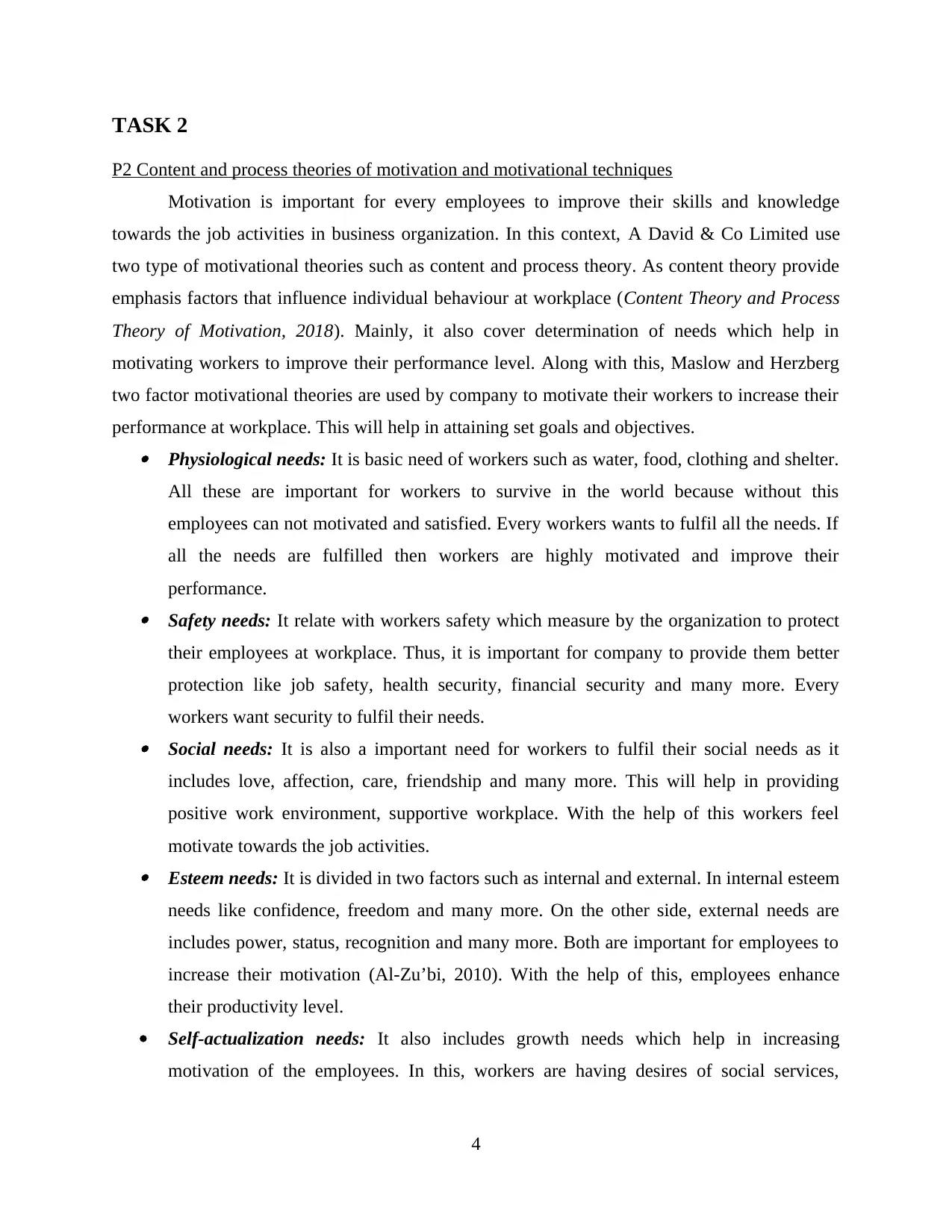
TASK 2
P2 Content and process theories of motivation and motivational techniques
Motivation is important for every employees to improve their skills and knowledge
towards the job activities in business organization. In this context, A David & Co Limited use
two type of motivational theories such as content and process theory. As content theory provide
emphasis factors that influence individual behaviour at workplace (Content Theory and Process
Theory of Motivation, 2018). Mainly, it also cover determination of needs which help in
motivating workers to improve their performance level. Along with this, Maslow and Herzberg
two factor motivational theories are used by company to motivate their workers to increase their
performance at workplace. This will help in attaining set goals and objectives. Physiological needs: It is basic need of workers such as water, food, clothing and shelter.
All these are important for workers to survive in the world because without this
employees can not motivated and satisfied. Every workers wants to fulfil all the needs. If
all the needs are fulfilled then workers are highly motivated and improve their
performance. Safety needs: It relate with workers safety which measure by the organization to protect
their employees at workplace. Thus, it is important for company to provide them better
protection like job safety, health security, financial security and many more. Every
workers want security to fulfil their needs. Social needs: It is also a important need for workers to fulfil their social needs as it
includes love, affection, care, friendship and many more. This will help in providing
positive work environment, supportive workplace. With the help of this workers feel
motivate towards the job activities. Esteem needs: It is divided in two factors such as internal and external. In internal esteem
needs like confidence, freedom and many more. On the other side, external needs are
includes power, status, recognition and many more. Both are important for employees to
increase their motivation (Al-Zu’bi, 2010). With the help of this, employees enhance
their productivity level.
Self-actualization needs: It also includes growth needs which help in increasing
motivation of the employees. In this, workers are having desires of social services,
4
P2 Content and process theories of motivation and motivational techniques
Motivation is important for every employees to improve their skills and knowledge
towards the job activities in business organization. In this context, A David & Co Limited use
two type of motivational theories such as content and process theory. As content theory provide
emphasis factors that influence individual behaviour at workplace (Content Theory and Process
Theory of Motivation, 2018). Mainly, it also cover determination of needs which help in
motivating workers to improve their performance level. Along with this, Maslow and Herzberg
two factor motivational theories are used by company to motivate their workers to increase their
performance at workplace. This will help in attaining set goals and objectives. Physiological needs: It is basic need of workers such as water, food, clothing and shelter.
All these are important for workers to survive in the world because without this
employees can not motivated and satisfied. Every workers wants to fulfil all the needs. If
all the needs are fulfilled then workers are highly motivated and improve their
performance. Safety needs: It relate with workers safety which measure by the organization to protect
their employees at workplace. Thus, it is important for company to provide them better
protection like job safety, health security, financial security and many more. Every
workers want security to fulfil their needs. Social needs: It is also a important need for workers to fulfil their social needs as it
includes love, affection, care, friendship and many more. This will help in providing
positive work environment, supportive workplace. With the help of this workers feel
motivate towards the job activities. Esteem needs: It is divided in two factors such as internal and external. In internal esteem
needs like confidence, freedom and many more. On the other side, external needs are
includes power, status, recognition and many more. Both are important for employees to
increase their motivation (Al-Zu’bi, 2010). With the help of this, employees enhance
their productivity level.
Self-actualization needs: It also includes growth needs which help in increasing
motivation of the employees. In this, workers are having desires of social services,
4
⊘ This is a preview!⊘
Do you want full access?
Subscribe today to unlock all pages.

Trusted by 1+ million students worldwide
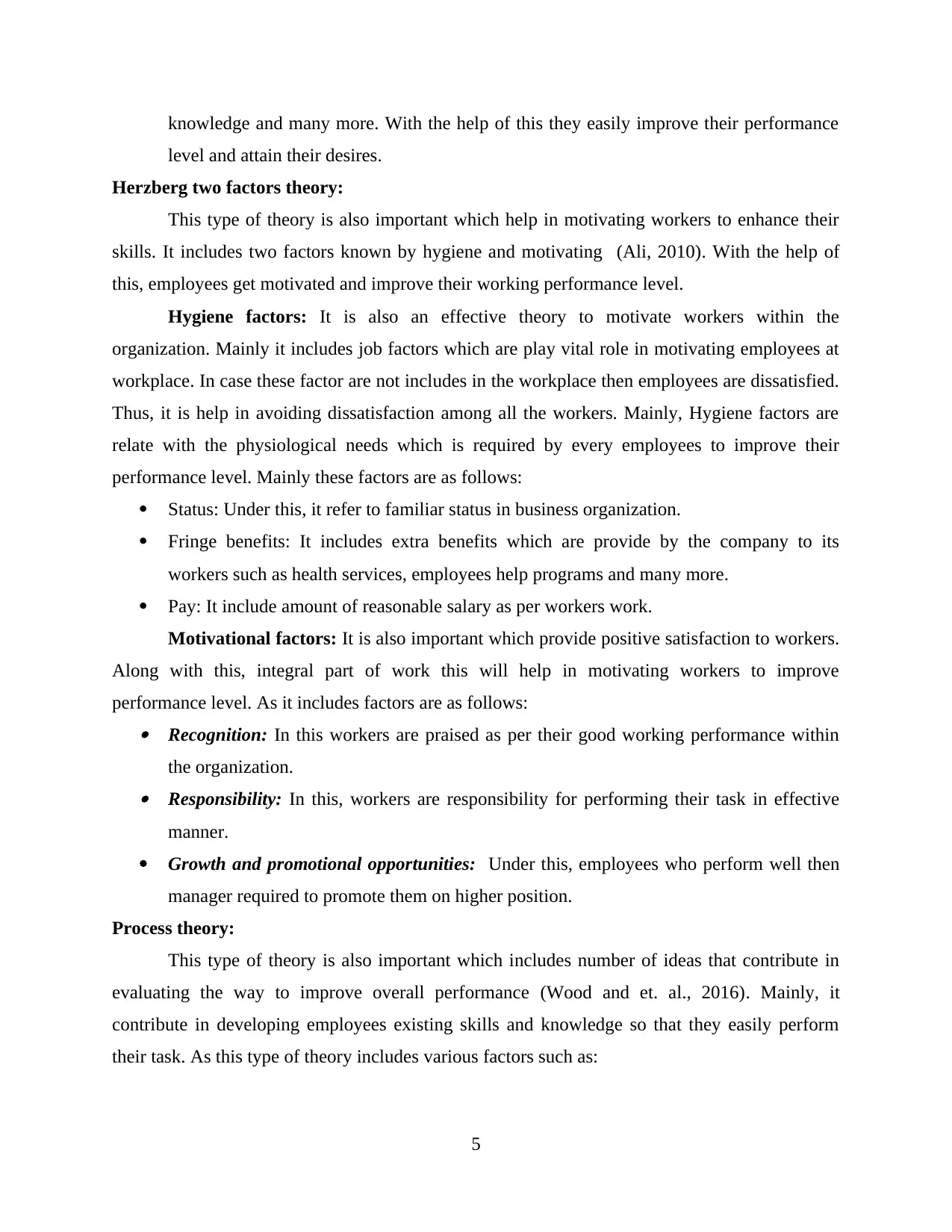
knowledge and many more. With the help of this they easily improve their performance
level and attain their desires.
Herzberg two factors theory:
This type of theory is also important which help in motivating workers to enhance their
skills. It includes two factors known by hygiene and motivating (Ali, 2010). With the help of
this, employees get motivated and improve their working performance level.
Hygiene factors: It is also an effective theory to motivate workers within the
organization. Mainly it includes job factors which are play vital role in motivating employees at
workplace. In case these factor are not includes in the workplace then employees are dissatisfied.
Thus, it is help in avoiding dissatisfaction among all the workers. Mainly, Hygiene factors are
relate with the physiological needs which is required by every employees to improve their
performance level. Mainly these factors are as follows:
Status: Under this, it refer to familiar status in business organization.
Fringe benefits: It includes extra benefits which are provide by the company to its
workers such as health services, employees help programs and many more.
Pay: It include amount of reasonable salary as per workers work.
Motivational factors: It is also important which provide positive satisfaction to workers.
Along with this, integral part of work this will help in motivating workers to improve
performance level. As it includes factors are as follows: Recognition: In this workers are praised as per their good working performance within
the organization. Responsibility: In this, workers are responsibility for performing their task in effective
manner.
Growth and promotional opportunities: Under this, employees who perform well then
manager required to promote them on higher position.
Process theory:
This type of theory is also important which includes number of ideas that contribute in
evaluating the way to improve overall performance (Wood and et. al., 2016). Mainly, it
contribute in developing employees existing skills and knowledge so that they easily perform
their task. As this type of theory includes various factors such as:
5
level and attain their desires.
Herzberg two factors theory:
This type of theory is also important which help in motivating workers to enhance their
skills. It includes two factors known by hygiene and motivating (Ali, 2010). With the help of
this, employees get motivated and improve their working performance level.
Hygiene factors: It is also an effective theory to motivate workers within the
organization. Mainly it includes job factors which are play vital role in motivating employees at
workplace. In case these factor are not includes in the workplace then employees are dissatisfied.
Thus, it is help in avoiding dissatisfaction among all the workers. Mainly, Hygiene factors are
relate with the physiological needs which is required by every employees to improve their
performance level. Mainly these factors are as follows:
Status: Under this, it refer to familiar status in business organization.
Fringe benefits: It includes extra benefits which are provide by the company to its
workers such as health services, employees help programs and many more.
Pay: It include amount of reasonable salary as per workers work.
Motivational factors: It is also important which provide positive satisfaction to workers.
Along with this, integral part of work this will help in motivating workers to improve
performance level. As it includes factors are as follows: Recognition: In this workers are praised as per their good working performance within
the organization. Responsibility: In this, workers are responsibility for performing their task in effective
manner.
Growth and promotional opportunities: Under this, employees who perform well then
manager required to promote them on higher position.
Process theory:
This type of theory is also important which includes number of ideas that contribute in
evaluating the way to improve overall performance (Wood and et. al., 2016). Mainly, it
contribute in developing employees existing skills and knowledge so that they easily perform
their task. As this type of theory includes various factors such as:
5
Paraphrase This Document
Need a fresh take? Get an instant paraphrase of this document with our AI Paraphraser
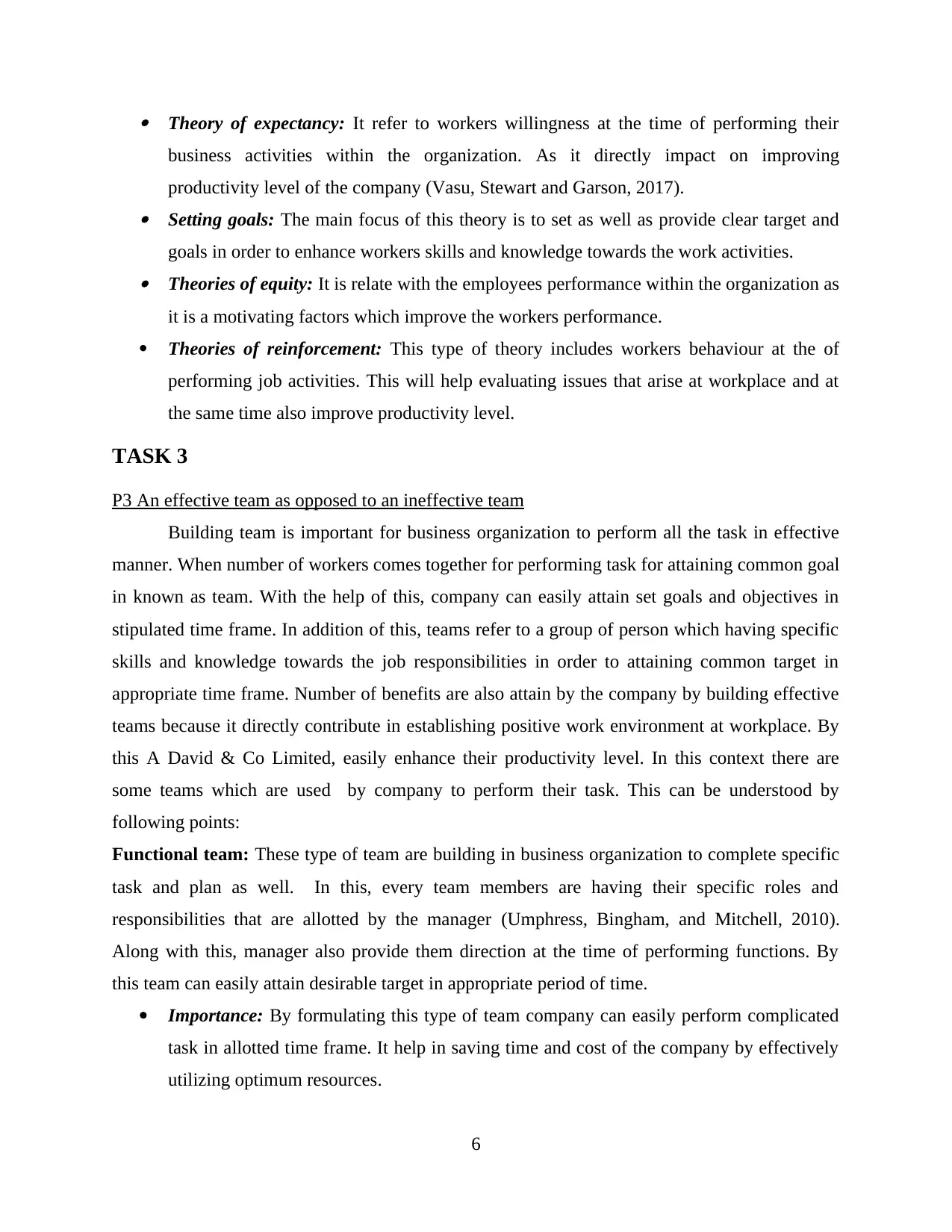
Theory of expectancy: It refer to workers willingness at the time of performing their
business activities within the organization. As it directly impact on improving
productivity level of the company (Vasu, Stewart and Garson, 2017). Setting goals: The main focus of this theory is to set as well as provide clear target and
goals in order to enhance workers skills and knowledge towards the work activities. Theories of equity: It is relate with the employees performance within the organization as
it is a motivating factors which improve the workers performance.
Theories of reinforcement: This type of theory includes workers behaviour at the of
performing job activities. This will help evaluating issues that arise at workplace and at
the same time also improve productivity level.
TASK 3
P3 An effective team as opposed to an ineffective team
Building team is important for business organization to perform all the task in effective
manner. When number of workers comes together for performing task for attaining common goal
in known as team. With the help of this, company can easily attain set goals and objectives in
stipulated time frame. In addition of this, teams refer to a group of person which having specific
skills and knowledge towards the job responsibilities in order to attaining common target in
appropriate time frame. Number of benefits are also attain by the company by building effective
teams because it directly contribute in establishing positive work environment at workplace. By
this A David & Co Limited, easily enhance their productivity level. In this context there are
some teams which are used by company to perform their task. This can be understood by
following points:
Functional team: These type of team are building in business organization to complete specific
task and plan as well. In this, every team members are having their specific roles and
responsibilities that are allotted by the manager (Umphress, Bingham, and Mitchell, 2010).
Along with this, manager also provide them direction at the time of performing functions. By
this team can easily attain desirable target in appropriate period of time.
Importance: By formulating this type of team company can easily perform complicated
task in allotted time frame. It help in saving time and cost of the company by effectively
utilizing optimum resources.
6
business activities within the organization. As it directly impact on improving
productivity level of the company (Vasu, Stewart and Garson, 2017). Setting goals: The main focus of this theory is to set as well as provide clear target and
goals in order to enhance workers skills and knowledge towards the work activities. Theories of equity: It is relate with the employees performance within the organization as
it is a motivating factors which improve the workers performance.
Theories of reinforcement: This type of theory includes workers behaviour at the of
performing job activities. This will help evaluating issues that arise at workplace and at
the same time also improve productivity level.
TASK 3
P3 An effective team as opposed to an ineffective team
Building team is important for business organization to perform all the task in effective
manner. When number of workers comes together for performing task for attaining common goal
in known as team. With the help of this, company can easily attain set goals and objectives in
stipulated time frame. In addition of this, teams refer to a group of person which having specific
skills and knowledge towards the job responsibilities in order to attaining common target in
appropriate time frame. Number of benefits are also attain by the company by building effective
teams because it directly contribute in establishing positive work environment at workplace. By
this A David & Co Limited, easily enhance their productivity level. In this context there are
some teams which are used by company to perform their task. This can be understood by
following points:
Functional team: These type of team are building in business organization to complete specific
task and plan as well. In this, every team members are having their specific roles and
responsibilities that are allotted by the manager (Umphress, Bingham, and Mitchell, 2010).
Along with this, manager also provide them direction at the time of performing functions. By
this team can easily attain desirable target in appropriate period of time.
Importance: By formulating this type of team company can easily perform complicated
task in allotted time frame. It help in saving time and cost of the company by effectively
utilizing optimum resources.
6
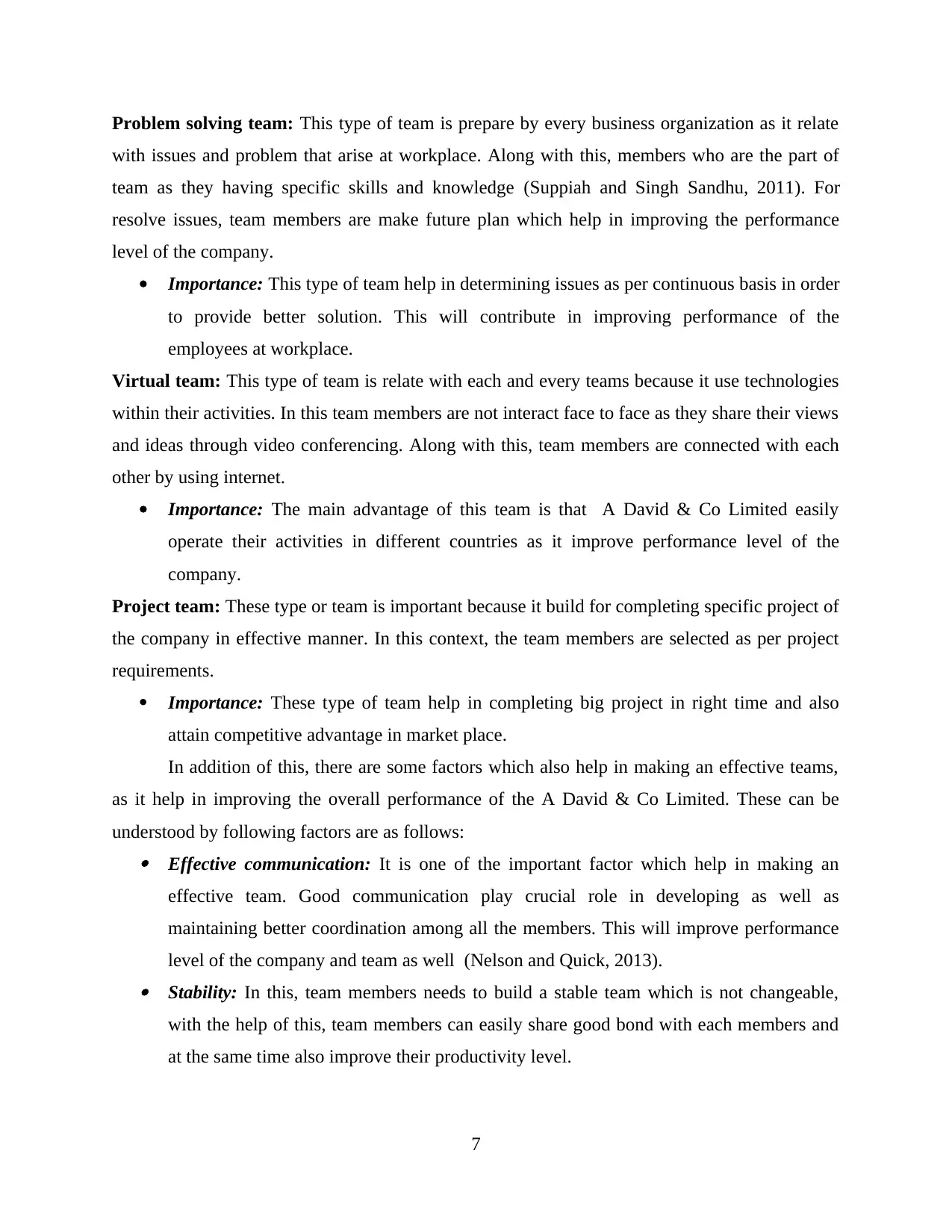
Problem solving team: This type of team is prepare by every business organization as it relate
with issues and problem that arise at workplace. Along with this, members who are the part of
team as they having specific skills and knowledge (Suppiah and Singh Sandhu, 2011). For
resolve issues, team members are make future plan which help in improving the performance
level of the company.
Importance: This type of team help in determining issues as per continuous basis in order
to provide better solution. This will contribute in improving performance of the
employees at workplace.
Virtual team: This type of team is relate with each and every teams because it use technologies
within their activities. In this team members are not interact face to face as they share their views
and ideas through video conferencing. Along with this, team members are connected with each
other by using internet.
Importance: The main advantage of this team is that A David & Co Limited easily
operate their activities in different countries as it improve performance level of the
company.
Project team: These type or team is important because it build for completing specific project of
the company in effective manner. In this context, the team members are selected as per project
requirements.
Importance: These type of team help in completing big project in right time and also
attain competitive advantage in market place.
In addition of this, there are some factors which also help in making an effective teams,
as it help in improving the overall performance of the A David & Co Limited. These can be
understood by following factors are as follows: Effective communication: It is one of the important factor which help in making an
effective team. Good communication play crucial role in developing as well as
maintaining better coordination among all the members. This will improve performance
level of the company and team as well (Nelson and Quick, 2013). Stability: In this, team members needs to build a stable team which is not changeable,
with the help of this, team members can easily share good bond with each members and
at the same time also improve their productivity level.
7
with issues and problem that arise at workplace. Along with this, members who are the part of
team as they having specific skills and knowledge (Suppiah and Singh Sandhu, 2011). For
resolve issues, team members are make future plan which help in improving the performance
level of the company.
Importance: This type of team help in determining issues as per continuous basis in order
to provide better solution. This will contribute in improving performance of the
employees at workplace.
Virtual team: This type of team is relate with each and every teams because it use technologies
within their activities. In this team members are not interact face to face as they share their views
and ideas through video conferencing. Along with this, team members are connected with each
other by using internet.
Importance: The main advantage of this team is that A David & Co Limited easily
operate their activities in different countries as it improve performance level of the
company.
Project team: These type or team is important because it build for completing specific project of
the company in effective manner. In this context, the team members are selected as per project
requirements.
Importance: These type of team help in completing big project in right time and also
attain competitive advantage in market place.
In addition of this, there are some factors which also help in making an effective teams,
as it help in improving the overall performance of the A David & Co Limited. These can be
understood by following factors are as follows: Effective communication: It is one of the important factor which help in making an
effective team. Good communication play crucial role in developing as well as
maintaining better coordination among all the members. This will improve performance
level of the company and team as well (Nelson and Quick, 2013). Stability: In this, team members needs to build a stable team which is not changeable,
with the help of this, team members can easily share good bond with each members and
at the same time also improve their productivity level.
7
⊘ This is a preview!⊘
Do you want full access?
Subscribe today to unlock all pages.

Trusted by 1+ million students worldwide
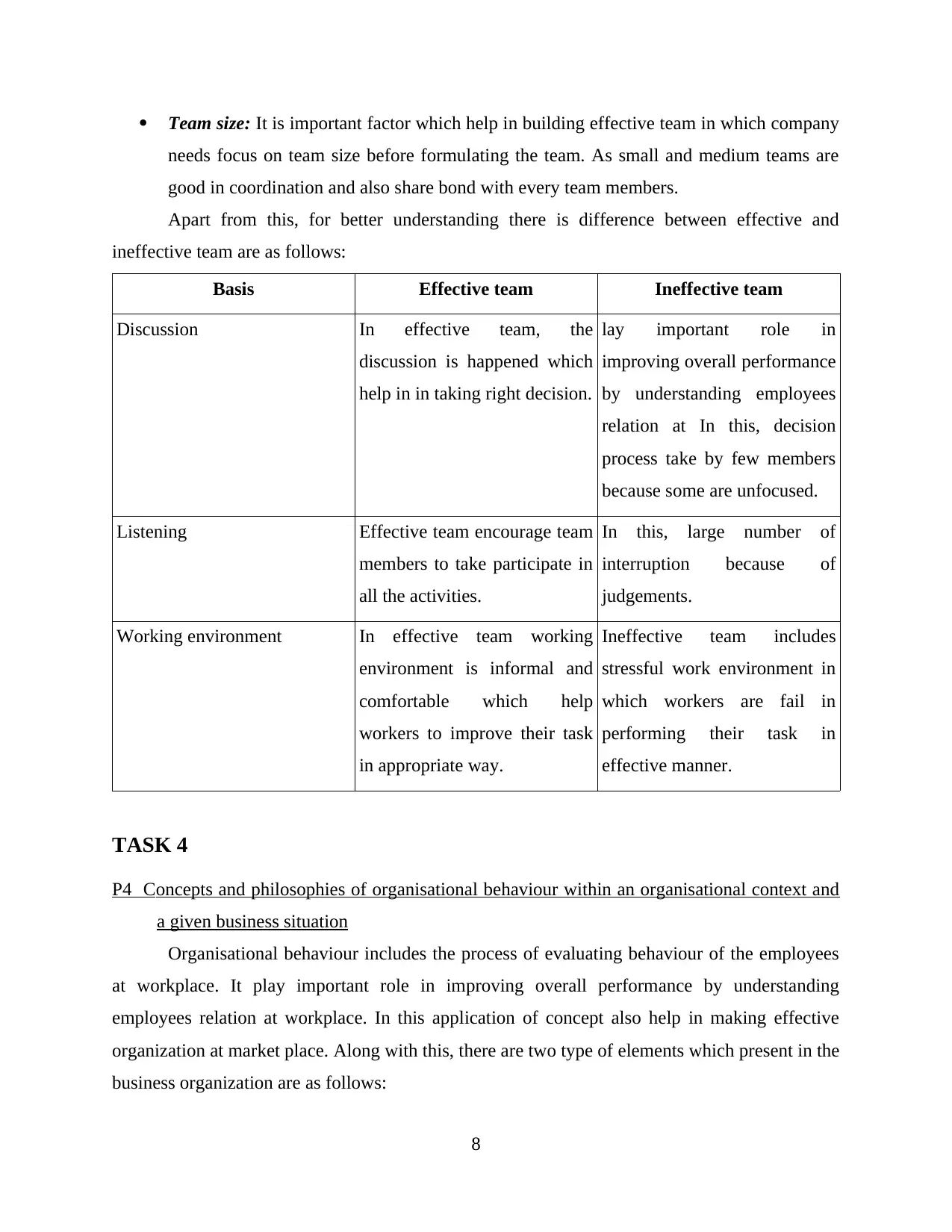
Team size: It is important factor which help in building effective team in which company
needs focus on team size before formulating the team. As small and medium teams are
good in coordination and also share bond with every team members.
Apart from this, for better understanding there is difference between effective and
ineffective team are as follows:
Basis Effective team Ineffective team
Discussion In effective team, the
discussion is happened which
help in in taking right decision.
lay important role in
improving overall performance
by understanding employees
relation at In this, decision
process take by few members
because some are unfocused.
Listening Effective team encourage team
members to take participate in
all the activities.
In this, large number of
interruption because of
judgements.
Working environment In effective team working
environment is informal and
comfortable which help
workers to improve their task
in appropriate way.
Ineffective team includes
stressful work environment in
which workers are fail in
performing their task in
effective manner.
TASK 4
P4 Concepts and philosophies of organisational behaviour within an organisational context and
a given business situation
Organisational behaviour includes the process of evaluating behaviour of the employees
at workplace. It play important role in improving overall performance by understanding
employees relation at workplace. In this application of concept also help in making effective
organization at market place. Along with this, there are two type of elements which present in the
business organization are as follows:
8
needs focus on team size before formulating the team. As small and medium teams are
good in coordination and also share bond with every team members.
Apart from this, for better understanding there is difference between effective and
ineffective team are as follows:
Basis Effective team Ineffective team
Discussion In effective team, the
discussion is happened which
help in in taking right decision.
lay important role in
improving overall performance
by understanding employees
relation at In this, decision
process take by few members
because some are unfocused.
Listening Effective team encourage team
members to take participate in
all the activities.
In this, large number of
interruption because of
judgements.
Working environment In effective team working
environment is informal and
comfortable which help
workers to improve their task
in appropriate way.
Ineffective team includes
stressful work environment in
which workers are fail in
performing their task in
effective manner.
TASK 4
P4 Concepts and philosophies of organisational behaviour within an organisational context and
a given business situation
Organisational behaviour includes the process of evaluating behaviour of the employees
at workplace. It play important role in improving overall performance by understanding
employees relation at workplace. In this application of concept also help in making effective
organization at market place. Along with this, there are two type of elements which present in the
business organization are as follows:
8
Paraphrase This Document
Need a fresh take? Get an instant paraphrase of this document with our AI Paraphraser
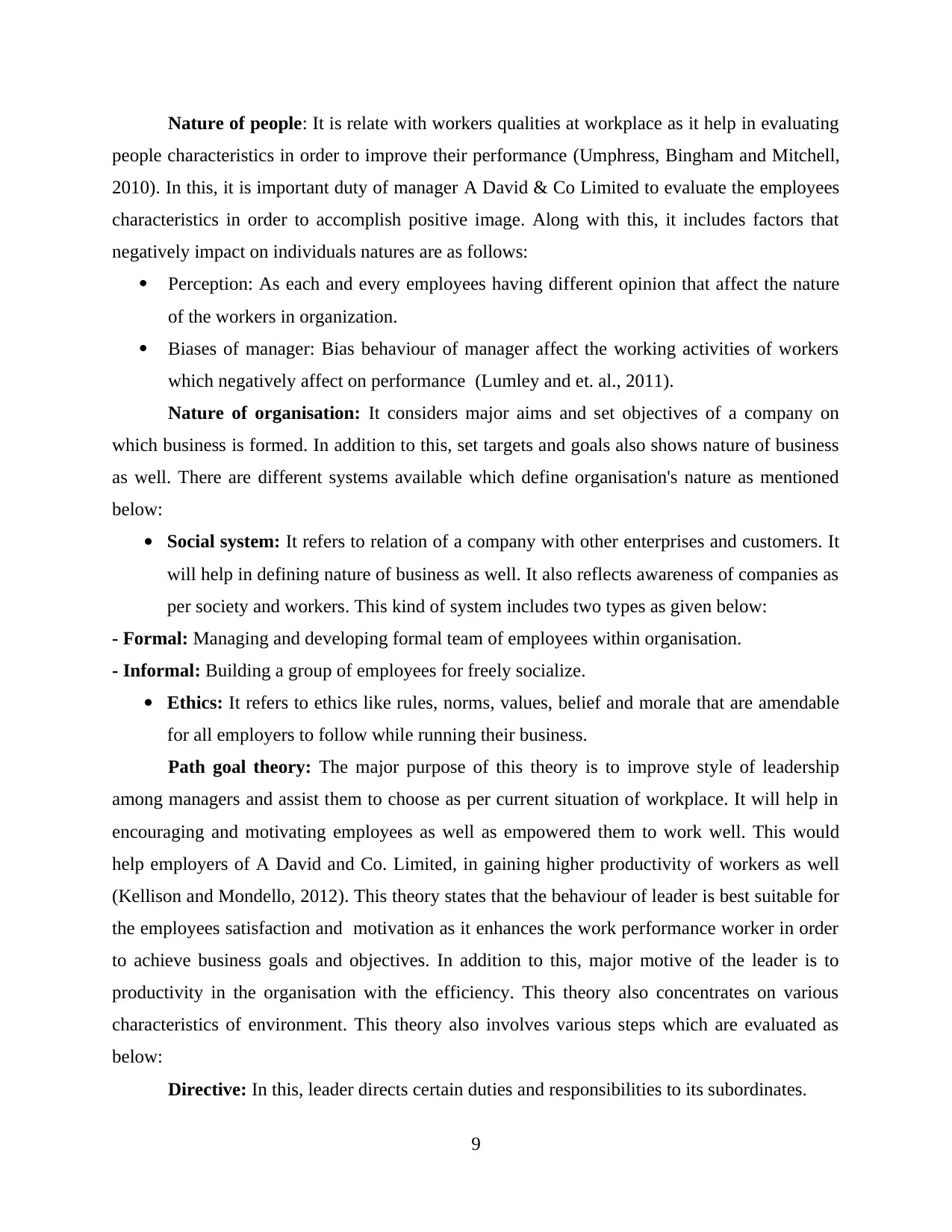
Nature of people: It is relate with workers qualities at workplace as it help in evaluating
people characteristics in order to improve their performance (Umphress, Bingham and Mitchell,
2010). In this, it is important duty of manager A David & Co Limited to evaluate the employees
characteristics in order to accomplish positive image. Along with this, it includes factors that
negatively impact on individuals natures are as follows:
Perception: As each and every employees having different opinion that affect the nature
of the workers in organization.
Biases of manager: Bias behaviour of manager affect the working activities of workers
which negatively affect on performance (Lumley and et. al., 2011).
Nature of organisation: It considers major aims and set objectives of a company on
which business is formed. In addition to this, set targets and goals also shows nature of business
as well. There are different systems available which define organisation's nature as mentioned
below:
Social system: It refers to relation of a company with other enterprises and customers. It
will help in defining nature of business as well. It also reflects awareness of companies as
per society and workers. This kind of system includes two types as given below:
- Formal: Managing and developing formal team of employees within organisation.
- Informal: Building a group of employees for freely socialize.
Ethics: It refers to ethics like rules, norms, values, belief and morale that are amendable
for all employers to follow while running their business.
Path goal theory: The major purpose of this theory is to improve style of leadership
among managers and assist them to choose as per current situation of workplace. It will help in
encouraging and motivating employees as well as empowered them to work well. This would
help employers of A David and Co. Limited, in gaining higher productivity of workers as well
(Kellison and Mondello, 2012). This theory states that the behaviour of leader is best suitable for
the employees satisfaction and motivation as it enhances the work performance worker in order
to achieve business goals and objectives. In addition to this, major motive of the leader is to
productivity in the organisation with the efficiency. This theory also concentrates on various
characteristics of environment. This theory also involves various steps which are evaluated as
below:
Directive: In this, leader directs certain duties and responsibilities to its subordinates.
9
people characteristics in order to improve their performance (Umphress, Bingham and Mitchell,
2010). In this, it is important duty of manager A David & Co Limited to evaluate the employees
characteristics in order to accomplish positive image. Along with this, it includes factors that
negatively impact on individuals natures are as follows:
Perception: As each and every employees having different opinion that affect the nature
of the workers in organization.
Biases of manager: Bias behaviour of manager affect the working activities of workers
which negatively affect on performance (Lumley and et. al., 2011).
Nature of organisation: It considers major aims and set objectives of a company on
which business is formed. In addition to this, set targets and goals also shows nature of business
as well. There are different systems available which define organisation's nature as mentioned
below:
Social system: It refers to relation of a company with other enterprises and customers. It
will help in defining nature of business as well. It also reflects awareness of companies as
per society and workers. This kind of system includes two types as given below:
- Formal: Managing and developing formal team of employees within organisation.
- Informal: Building a group of employees for freely socialize.
Ethics: It refers to ethics like rules, norms, values, belief and morale that are amendable
for all employers to follow while running their business.
Path goal theory: The major purpose of this theory is to improve style of leadership
among managers and assist them to choose as per current situation of workplace. It will help in
encouraging and motivating employees as well as empowered them to work well. This would
help employers of A David and Co. Limited, in gaining higher productivity of workers as well
(Kellison and Mondello, 2012). This theory states that the behaviour of leader is best suitable for
the employees satisfaction and motivation as it enhances the work performance worker in order
to achieve business goals and objectives. In addition to this, major motive of the leader is to
productivity in the organisation with the efficiency. This theory also concentrates on various
characteristics of environment. This theory also involves various steps which are evaluated as
below:
Directive: In this, leader directs certain duties and responsibilities to its subordinates.
9
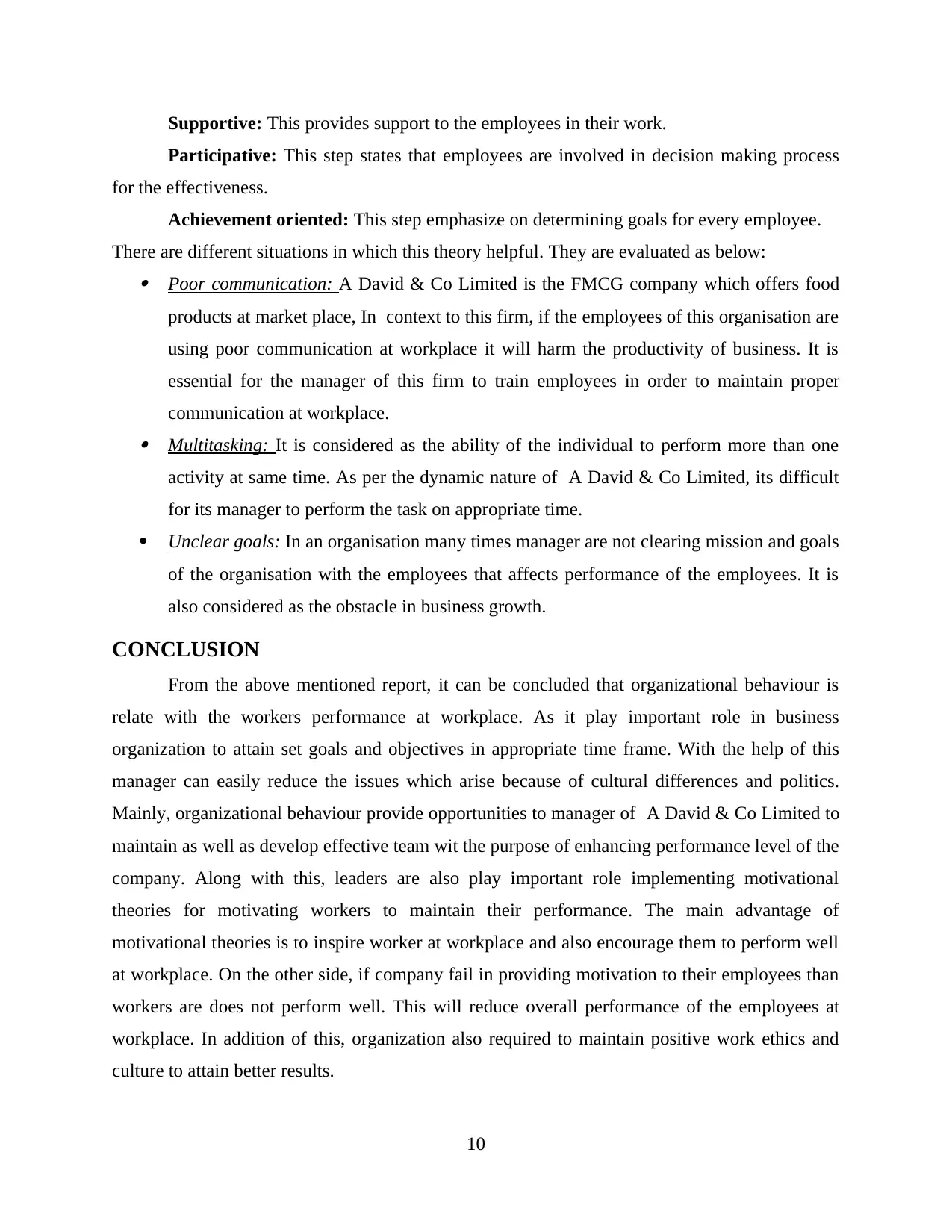
Supportive: This provides support to the employees in their work.
Participative: This step states that employees are involved in decision making process
for the effectiveness.
Achievement oriented: This step emphasize on determining goals for every employee.
There are different situations in which this theory helpful. They are evaluated as below: Poor communication: A David & Co Limited is the FMCG company which offers food
products at market place, In context to this firm, if the employees of this organisation are
using poor communication at workplace it will harm the productivity of business. It is
essential for the manager of this firm to train employees in order to maintain proper
communication at workplace. Multitasking: It is considered as the ability of the individual to perform more than one
activity at same time. As per the dynamic nature of A David & Co Limited, its difficult
for its manager to perform the task on appropriate time.
Unclear goals: In an organisation many times manager are not clearing mission and goals
of the organisation with the employees that affects performance of the employees. It is
also considered as the obstacle in business growth.
CONCLUSION
From the above mentioned report, it can be concluded that organizational behaviour is
relate with the workers performance at workplace. As it play important role in business
organization to attain set goals and objectives in appropriate time frame. With the help of this
manager can easily reduce the issues which arise because of cultural differences and politics.
Mainly, organizational behaviour provide opportunities to manager of A David & Co Limited to
maintain as well as develop effective team wit the purpose of enhancing performance level of the
company. Along with this, leaders are also play important role implementing motivational
theories for motivating workers to maintain their performance. The main advantage of
motivational theories is to inspire worker at workplace and also encourage them to perform well
at workplace. On the other side, if company fail in providing motivation to their employees than
workers are does not perform well. This will reduce overall performance of the employees at
workplace. In addition of this, organization also required to maintain positive work ethics and
culture to attain better results.
10
Participative: This step states that employees are involved in decision making process
for the effectiveness.
Achievement oriented: This step emphasize on determining goals for every employee.
There are different situations in which this theory helpful. They are evaluated as below: Poor communication: A David & Co Limited is the FMCG company which offers food
products at market place, In context to this firm, if the employees of this organisation are
using poor communication at workplace it will harm the productivity of business. It is
essential for the manager of this firm to train employees in order to maintain proper
communication at workplace. Multitasking: It is considered as the ability of the individual to perform more than one
activity at same time. As per the dynamic nature of A David & Co Limited, its difficult
for its manager to perform the task on appropriate time.
Unclear goals: In an organisation many times manager are not clearing mission and goals
of the organisation with the employees that affects performance of the employees. It is
also considered as the obstacle in business growth.
CONCLUSION
From the above mentioned report, it can be concluded that organizational behaviour is
relate with the workers performance at workplace. As it play important role in business
organization to attain set goals and objectives in appropriate time frame. With the help of this
manager can easily reduce the issues which arise because of cultural differences and politics.
Mainly, organizational behaviour provide opportunities to manager of A David & Co Limited to
maintain as well as develop effective team wit the purpose of enhancing performance level of the
company. Along with this, leaders are also play important role implementing motivational
theories for motivating workers to maintain their performance. The main advantage of
motivational theories is to inspire worker at workplace and also encourage them to perform well
at workplace. On the other side, if company fail in providing motivation to their employees than
workers are does not perform well. This will reduce overall performance of the employees at
workplace. In addition of this, organization also required to maintain positive work ethics and
culture to attain better results.
10
⊘ This is a preview!⊘
Do you want full access?
Subscribe today to unlock all pages.

Trusted by 1+ million students worldwide
1 out of 14
Related Documents
Your All-in-One AI-Powered Toolkit for Academic Success.
+13062052269
info@desklib.com
Available 24*7 on WhatsApp / Email
![[object Object]](/_next/static/media/star-bottom.7253800d.svg)
Unlock your academic potential
Copyright © 2020–2026 A2Z Services. All Rights Reserved. Developed and managed by ZUCOL.





